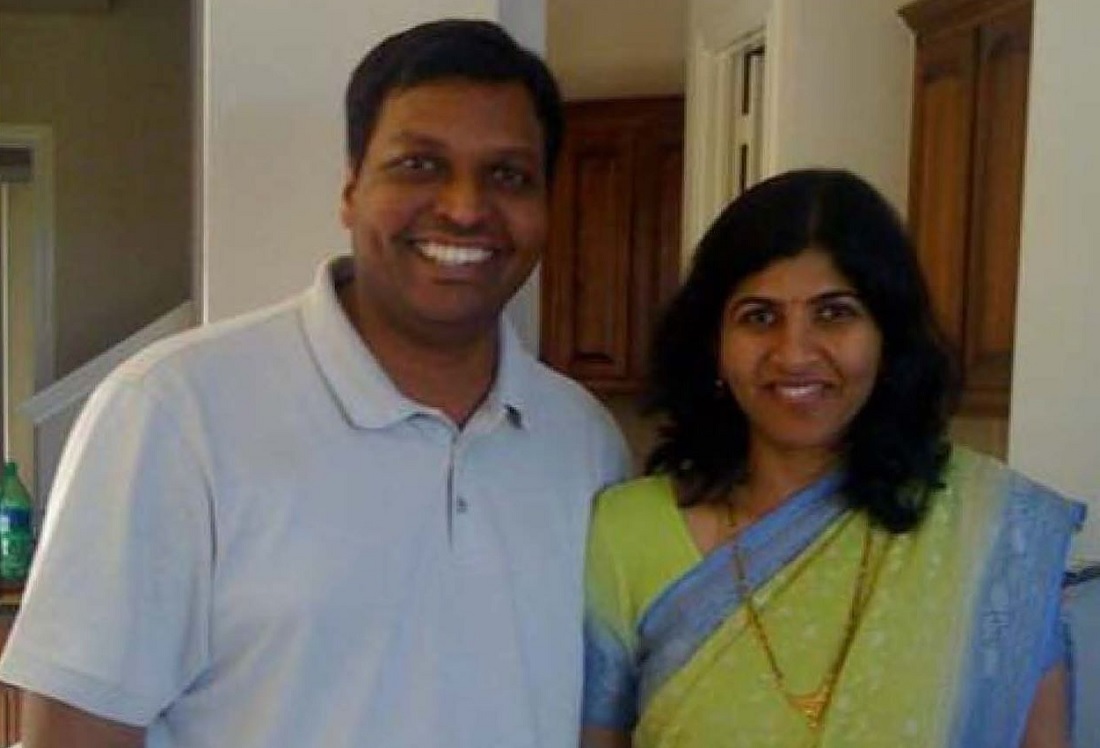
The homicide, second involving Indian American couples in two months, illustrates the dangers of domestic violence incidents going unreported and unaddressed.
The murder of 46-year-old Shanti Nakirekanti in Sugar Land, Texas, on Monday morning, apparently by her husband, Sreenivas Nakirekanti, who turned the gun on himself after killing his wife, has once again highlighted the issue of domestic violence within the Indian American and the larger South Asian American communities.
According to friends and neighbors, the Nakirekantis appeared like a normal couple who betrayed few signs of relationship troubles to the outside world. Yet, the conjugal unhappiness led to the violent deaths of the two before the break of dawn on Monday.
The murder-suicide was the second homicide case to rock the Indian American community this year. On January 11, Indian American Ankita Verma (29) was stabbed to death by her husband, Amit Kumar, in Baltimore.
Kumar, 39, fled the scene and turned himself to the police in Syracuse, New York, a few days later.
RELATED: Sugar Land murder-suicide: Sreenivas Nakirekanti himself called 911 before committing suicide (February 19, 2019)
Held in custody, without bail, at the Onondaga County Jail in upstate New York, Kumar was awaiting extradition to Baltimore for his arraignment and an expected 1st degree murder charge.
In both cases, no motive has been given for the gruesome murders and, on the exterior, both couples looked like any other normal husband and wife.
The two incidents, 1,500 miles and six weeks apart, are cruel reminders that cases of domestic violence often go unreported and unaddressed among the Indian American community until it is too late.
It is widely believed that instances of domestic violence amongst Indian Americans and South Asians are grossly underreported, which can lead to fatal incidents such as the Sugar Land murder-suicide.
Often due to fear of stigma or because of being on dependent visas, H4 and L4, in the United States, with no friends or relatives to confide in, women in abusive relationships are left to fend for themselves.
In her recent book Never Again, Indian American lawyer Anu Peshawaria highlighted this problem, based on her personal experiences with victims of domestic violence amongst South Asian Americans.
Even though no national studies have been conducted to understand the problem within the South Asian American demography, there has been enough anecdotal evidence to suggest that South Asian women who undergo marital abuse find themselves trapped.
A fact sheet released as part of “Domestic Violence in South Asian Communities in 2017” report by the Asian Pacific Institute on Gender Based Violence (API GBV) provided a startling sample. In a study of a convenience sample of 208 South Asian American women recruited through community outreach in the Greater Boston area, 21 percent reported having ever experienced physical and/or sexual abuse at the hands of their intimate partner; 15 percent reported such experience during the previous year.
In a separate study, consisting of face-to-face interviews with 1,577 Asian Americans recruited from Asian American organizations and gathering places in the greater Houston area in Texas, 20 percent of Indian American respondents (154 males and females) reported experiencing at least one form of intimate partner violence, ranging from “thrown objects at the respondent” to “used a knife or gun on the respondent” during the previous year.
The same API GBV study also tracked domestic violence related homicides among Asian Americans in the United States over a six year period, between 2000 and 2005. It found that of the 160 such homicides, 19 percent of victims were South Asian Americans and more than a quarter (32 of 122) perpetrators were South Asian Americans.
“The success of the South Asian diaspora in the United States is not defined by our cumulative wealth, it is defined by our commitment to building gender justice and equity,” said Kavita Mehra, Executive Director of Sakhi, a New York City-based anti-domestic violence organization for South Asian women. “Gender-based violence impacts 25 percent of women across the United States. For the South Asian diaspora, that number jumps to 40 percent of women experiencing gender-based violence. For 30 years, Sakhi for South Asian women has been serving our community to eradicate gender-based violence, and the need for our work has never been greater.”
Many similar studies also point out that domestic violence is a problem that needs a serious intervention.
According to Kiran, an organization that provides services and empowers South Asian victims of domestic violence across North Carolina, although “domestic violence is rarely talked about in South Asian communities, it is a rampant and preventable public health problem that deserves our immediate action.” The organization says that domestic violence “is more than just physical abuse. It is physical, mental, emotional, financial, and/or sexual abuse that occurs between people that live together, are dating, are married, or are related in some way. These forms of abuse can have serious and long-lasting impacts on the survivors, their children, and other family members.”
ALSO READ:
Indian American energy executive kills wife and turns gun on himself in Texas murder suicide (February 19, 2019)
Sakhi to honor Sharmeen Obaid-Chinoy and Rashmy Chatterjee at its New York gala on April 6 (April 5, 2018)
Empowering women is more than giving opportunities: Manavi’s Navneet Bhalla (April 8, 2018)
‘Invisible Citizens,’ a docudrama on domestic violence, slated to release in October (September 28, 2018)
Son brings parents from India to ‘discipline’ wife; all three beat her mercilessly (September 5, 2017)
More protection for H-1B visa workers, work permits for women who face domestic violence (July 16, 2015)
Educating men is also important: Priya Kulkarni (September 15, 2013)




1 Comment
We do proud of ! We feeing the
#FeelTheBern